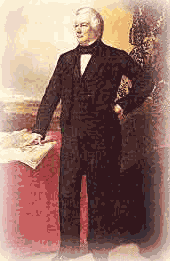Millard Fillmore was born in a log cabin in Locke, New York. In his youth, Fillmore's family lost their home in a title dispute and moved into the Finger Lakes region. The lad received little schooling; his spent his time on farm work and clearing land. At age 14 he was apprenticed to a textile maker, a relationship which proved to be extremely unsatisfactory. Fillmore was able to find a new master, but in 1819 paid $30 to gain his freedom. Fillmore taught schoolchildren and studied law with a local judge. In 1823 he opened a law office in East Aurora, New York. Five years later he was elected to the New York state legislature, aided by the prominent political boss, Thurlow Weed; the two would become political rivals. Fillmore relocated to Buffalo, New York in 1830, which would remain his primary residence for the remainder of his life.
In 1832, Fillmore was elected to the House of Representatives. He began his term aligned with the Anti-Masonic Party, but quickly affiliated with the Whigs. Fillmore was a supporter of the American System and in a later Congressional term played a major role in the passage of the Tariff of 1842.
Fillmore’s Congressional career revealed his position on slavery. He was opposed to expansion of the practice, but also disapproved of abolitionist tactics. He expressed increasing concern about the rising tide of immigrants entering the country. Fillmore believed that the newcomers benefited the Democratic Party and threatened the jobs of existing citizens.
In 1844, Fillmore lost a race for the New York governorship, then returned to the practice of law. He became chancellor of the University of Buffalo in 1846 and the following year, state comptroller.
Zachary Taylor selected Fillmore as his Whig running mate for the Election of 1848. The Democrats were split on the slavery issue and many deserted to the Free-Soil Party, opening the door for a Whig victory.
As vice president, Fillmore presided over the Senate with competence. In July 1850, Taylor died, having served only 16 months in office.
As president, Fillmore reversed Taylor’s stand and supported the Compromise of 1850. In his first State of the Union Address on December 2, 1850, he contrasted the warm feelings that Americans might feel towards attempts to overthrow foreign despots with practical American interests:
Fillmore taught schoolchildren and studied law with a local judge. In 1823 he opened a law office in East Aurora, New York. Five years later he was elected to the New York state legislature, aided by the prominent political boss, Thurlow Weed; the two would become political rivals. Fillmore relocated to Buffalo, New York in 1830, which would remain his primary residence for the remainder of his life.
In 1832, Fillmore was elected to the House of Representatives. He began his term aligned with the Anti-Masonic Party, but quickly affiliated with the Whigs. Fillmore was a supporter of the American System and in a later Congressional term played a major role in the passage of the Tariff of 1842.
Fillmore’s Congressional career revealed his position on slavery. He was opposed to expansion of the practice, but also disapproved of abolitionist tactics. He expressed increasing concern about the rising tide of immigrants entering the country. Fillmore believed that the newcomers benefited the Democratic Party and threatened the jobs of existing citizens.
In 1844, Fillmore lost a race for the New York governorship, then returned to the practice of law. He became chancellor of the University of Buffalo in 1846 and the following year, state comptroller.
Zachary Taylor selected Fillmore as his Whig running mate for the Election of 1848. The Democrats were split on the slavery issue and many deserted to the Free-Soil Party, opening the door for a Whig victory.
As vice president, Fillmore presided over the Senate with competence. In July 1850, Taylor died, having served only 16 months in office.
As president, Fillmore reversed Taylor’s stand and supported the Compromise of 1850. In his first State of the Union Address on December 2, 1850, he contrasted the warm feelings that Americans might feel towards attempts to overthrow foreign despots with practical American interests:
Among the acknowledged rights of nations is that which each possesses of establishing that form of government which it may deem most conducive to the happiness and prosperity of its own citizens, of changing that form as circumstances may require, and of managing its internal affairs according to its own will. The people of the United States claim this right for themselves, and they readily concede it to others. Hence it becomes an imperative duty not to interfere in the government or internal policy of other nations; and although we may sympathize with the unfortunate or the oppressed everywhere in their struggles for freedom, our principles forbid us from taking any part in such foreign contests. We make no wars to promote or to prevent successions to thrones, to maintain any theory of a balance of power, or to suppress the actual government which any country chooses to establish for itself. We instigate no revolutions, nor suffer any hostile military expeditions to be fitted out in the United States to invade the territory or provinces of a friendly nation.In the Election of 1852, Millard Fillmore received the backing of the Southern Whigs, but the Northern faction objected to his enforcement of the Fugitive Slave Act. Winfield Scott received the party’s nomination. In the Election of 1856 Fillmore was nominated by both the Whigs and the Know-Nothing Movement. The new Republican Party siphoned off votes, enabling Democrat James Buchanan to become president. During the Civil War Fillmore was a strong supporter of the Union, but was openly critical of some of Abraham Lincoln's actions. He remained active in civic affairs in Buffalo until the end of his life in 1874.